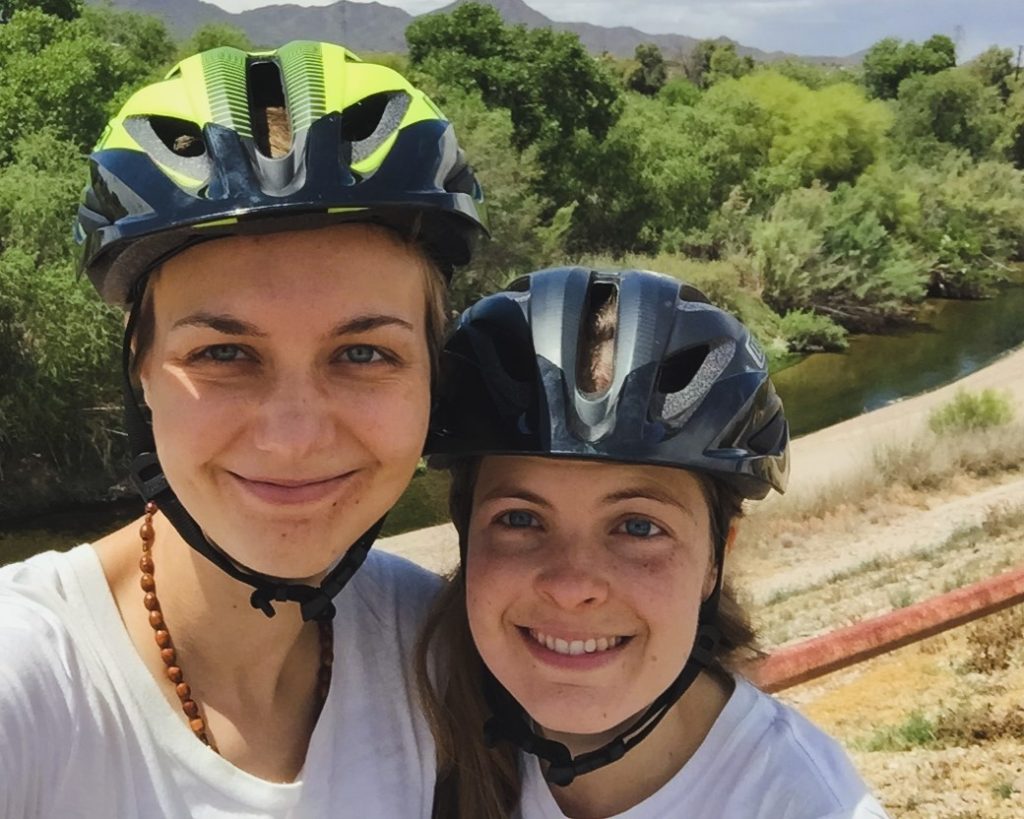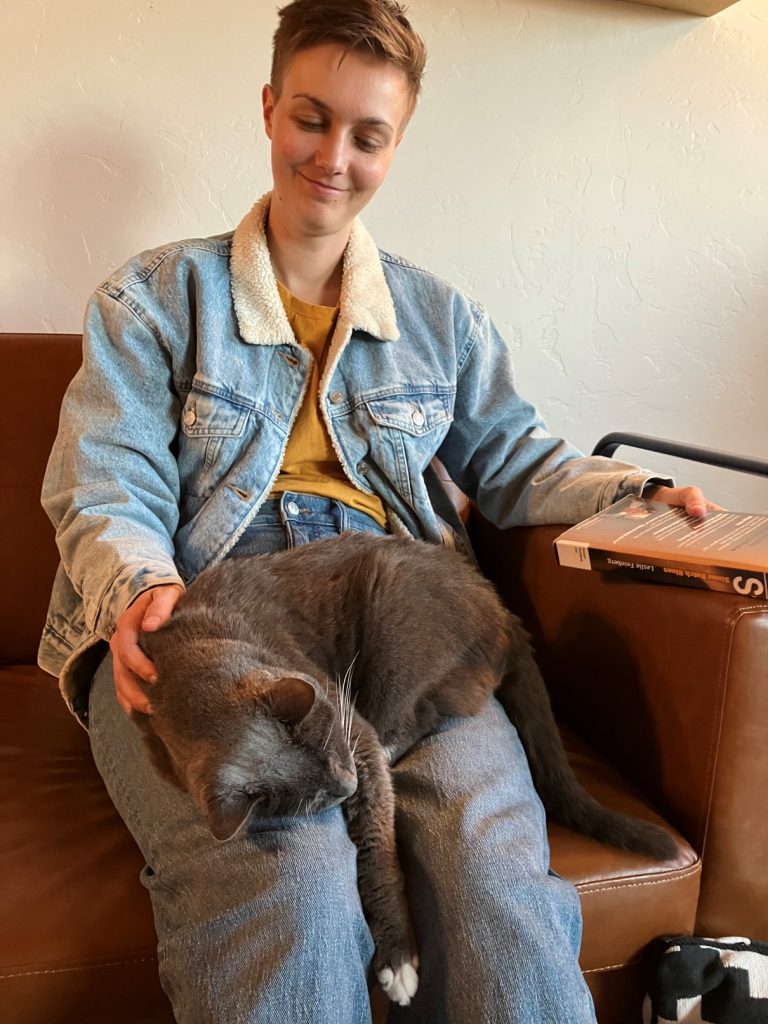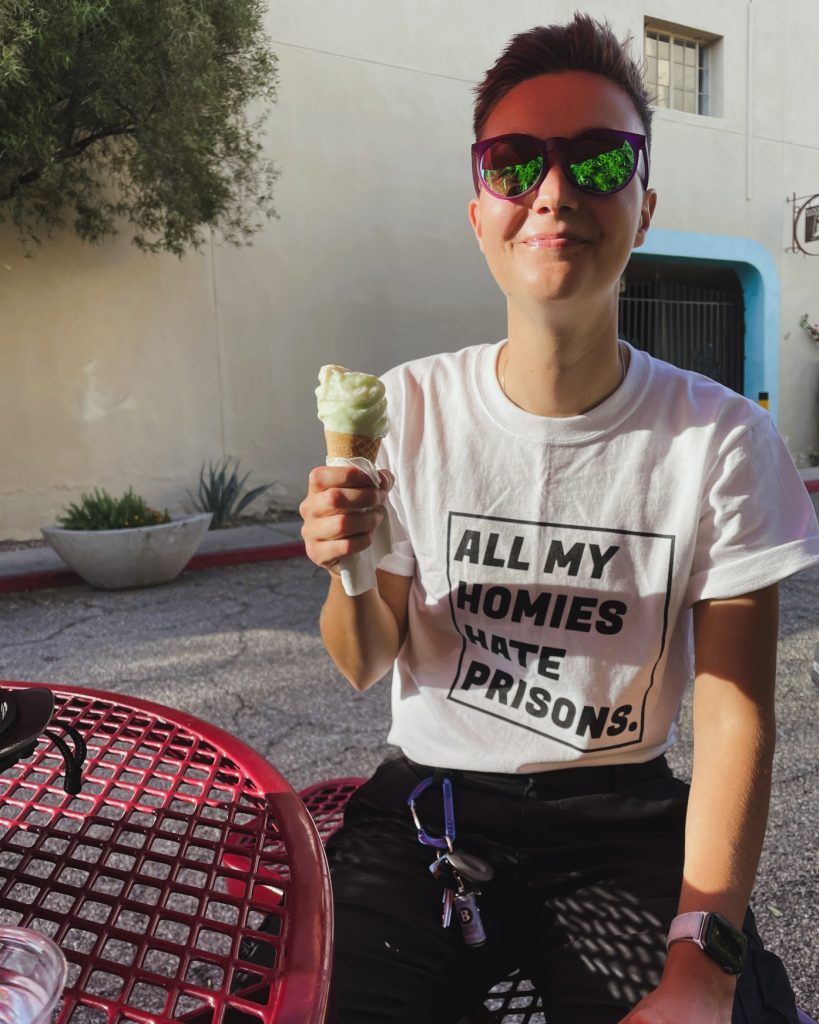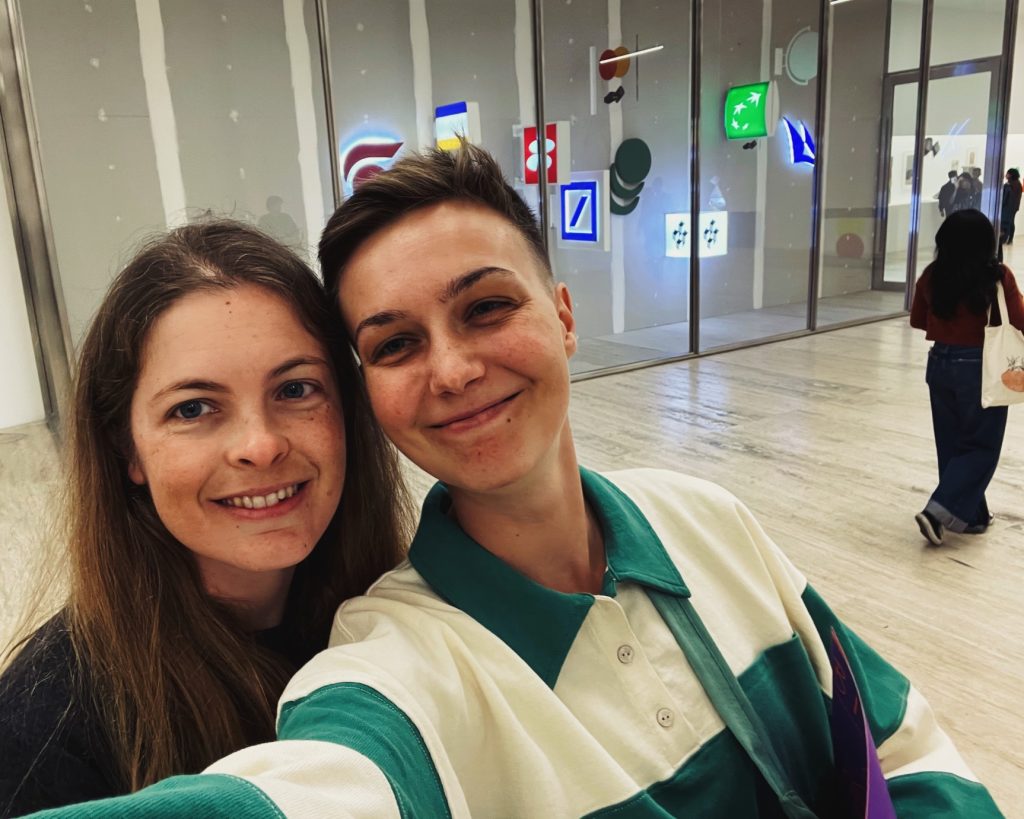Meet Jacquelyn Oesterblad
“The advice that led me into law school in the first place was that your vocation should lie at the intersection of your rage and your joy.”
Jacquelyn Oesterblad is a Skadden Fellow in the Debtors’ Prison Project, where she litigates cases related to the criminalization of poverty and homelessness. Jacq’s work is particularly focused on the fines and fees impacting unhoused people in her home state of Arizona.
She recently sat down for an interview with Public Justice’s Membership Manager Nikki Duffney.

Nikki: How did you get into this work and what radicalized you to participate in the area of law that you specialize in?
Jacquelyn: I went to law school already interested in criminal legal system issues. I’d been kept up at night by stories like Darren Rainey’s or Ricky Ray Rector’s, but I wasn’t exactly sure what that would look like as a lawyer. So, I started law school with a pretty open mind about what kind of public interest work I would end up in, but one of the first things I did was join the Green Haven Prison Project. We went to Green Haven Prison in New York once a month for circle talk conversations with some of the men in this organization called PACT. We would have a reading and we would talk about that, but they also had this whole infrastructure of other things that they were doing, like restorative justice circles and learning how to prepare for meetings with their victims’ families, and talking and thinking seriously about accountability, mercy, and justice.
Being in those conversations, I realized it was the first time I’d ever heard anyone take any of those concepts so seriously. I’d never met people on the outside who were so invested in thinking about what it means to become a good person and then doing it. Everyone on the outside just assumes that we’re good people, by default. We justify the ways we harm people and tell ourselves, I would never do something that bad. I’m not like those people in prison. We turn people in prison into the scapegoats, where we want to punish them because we need to believe that they are so much worse than we are, to feel more secure in ourselves.
I’m responsible for myself, for making sure I don’t hurt other people. Which is why it doesn’t matter to me what a person does, it’s still wrong for us, for me, to put that person in a cage to be forgotten and tortured or killed.
I’m Catholic, we have a tradition of doing Confession. And first of all, very few people do it anymore. It’s out of fashion because it’s so uncomfortable to do, when you do it well. And then, my priest friends had told me that everyone always wants to start their confession with, “Well Father, I haven’t murdered anyone or anything. But I did do….” It’s like this universal gut instinct that we have, to use other people’s bigger sins or harms to make ours feel smaller. But it doesn’t matter what other people do. I’m responsible for myself, for making sure I don’t hurt other people. Which is also why it doesn’t matter to me what a person does, it’s still wrong for us, for me, to put that person in a cage to be forgotten and tortured or killed.
So those conversations in Green Haven made me think about that. These guys were really grappling with—what does it mean to have hurt someone and how do I move forward from that? What does it say about me as a person if I can’t make that better? And how do I live anyway? They inspired me to try to be a better person. And they made me less secure in the idea that I already am. I have to work at it, as we all do.
Now I’ve tried to organize my life around the idea we shouldn’t have scapegoats. That everyone should be willing to take accountability for what they have done and then move forward. And that everyone should be given that right to move forward. I want to use my legal degree to help people who are in danger of going to prison, or are in prison, or are trying to recover after going to prison. Because I think that they’re still really cool people, and they are people—people that everyone seems to feel like they have permission to hate and not think of as people anymore.
Thank you for that response. That is real. It made me think of Mia Mingus, she’s an educator and works in transformational justice. Mia is a disability justice advocate and is who I first learned about transformational justice, and what it could look like to have cycles of accountability. Because we all, just as you were saying, we all commit harms and we all are harmed, so how do we live in community with each other, with balance? Not just going to punishment, because accountability does not need to be punitive.
What is the biggest challenge or reward that you face doing this work?
I think the rewards are obvious in that our clients are wonderful people, and we get to help them stand up for themselves.
The challenges can also be kind of obvious in that the system is, I mean the law itself, is designed against us. And then people’s moral instincts are often so different from mine. Like, when we’re dealing with fines and fees, people will say, “Well, of course people who use the criminal legal system should pay for it.” I have to think hard about how to shift that conversation and reframe it. Also, just—people who can’t pay simply can’t pay, and all we’re doing is wasting our money trying to collect water from a stone.
The narrative aspect is a challenge, and sometimes just trying to sit with and understand the way that other people think about these things differently can be frustrating for me. I learn something new every time, but it can be frustrating.
What grassroots or movement building groups are you involved with that you would like to see get more mainstream attention?
I often do case development here in Arizona around the criminalization of homelessness, and through that I’ve been able to work with various mutual aid groups. That’s been really cool, a lesson that you don’t have to wait to take action. You should also vote for good people and support nonprofits with your donations, but you don’t have to wait for them to do things. You can get a group of friends and show up at the park with food and blankets and life-sustaining resources. We can take care of each other.


The places with the most homelessness are the places with the highest rents, not the highest incidence of drug addiction or mental health issues or any of these other things that people use to try to blame unhoused folks for their situation.
And then, on the other side of that, I also follow and try to plug into YIMBY activism and, like, anti-car movements or others who are working to get more housing and make our cities more dense and more livable and more affordable in the first place. All the research, so much data, shows that the cause of homelessness is the price of housing. The places with the most homelessness are the places with the highest rents, not the highest incidence of drug addiction or mental health issues or any of these other things that people use to try to blame unhoused folks for their situation.
So, I think both sides are important. Doing that immediate action for someone in front of you who needs help right now. But we also need to do a lot of longer-term planning around how to house more people for less money in the future—and make our cities nice, sustainable places. I try to plug into both.
I love the relationship in mutual aid to direct action; if you see the need and you act on it. It is a valuable space that mutual aid is not exclusively occupying, but that is where you can see a lot of action happening.
What is one skill that you would like to sharpen or develop this year?
I’ve spent most of my two fellowship years at Public Justice learning about good legal writing and especially fast good legal writing. In law school, you’d get a semester to do a brief, and that felt like a nightmare as it was. So, learning to do it in a week or two has been fun, but I still struggle with the page limits and the last-second cuts, and that’s Leslie’s favorite thing. She’s an absolute master, so I think the thing I want to learn with my last couple months of fellowship is how to cut a thousand words in 30 minutes like Leslie.
Blessings on that journey. What is the best piece of career advice that you’ve received, and would you adapt or change that advice to share with younger attorneys?
I am very much a younger attorney in the accepting career advice stage, so I don’t like this question. But something that was said to me at the beginning of law school that’s served me well enough so far is: reject the tyranny of the ten-year plan. I feel like a lot of people, when they’re starting off in law school, will pick the place they want to be in ten years and sort of backwards-engineer—What do I have to do to get there? And I find that can be a formula for a lot of misery. People do things in law school and their first few years of their career that they don’t even enjoy just because they’re like, This is necessary to get to the next stage. Instead, I’m always paying attention to what do I want to be doing now? What skill do I want to be developing now? How do I want to spend my time now? And if I just do that continually, then the thing that that leads me to will probably be something that I enjoy, because I enjoyed all the steps required to get there. I’m just not very interested in being miserable for eight years for an end that probably won’t even come to fruition or won’t make me that happy when I reach it.
The advice that led me into law school in the first place was that your vocation should lie at the intersection of your rage and your joy. I don’t think that I would be able to sleep at night if I weren’t getting to do work every day on the things that make me angry. It’s important to try to find a way to turn your job into something that feels meaningful to you. But also, it’s just not sustainable if you don’t find joy in it or don’t find it fun.
Absolutely! What was the last book you read?
I’m one of those people who always has like two or three physical books and an audiobook going. The last physical book I finished was Minor Detail by Adania Shibli, a Palestinian author.
What is a fun fact that people probably don’t know about you?
I studied abroad in college in Cairo in the fall of 2012 and summer of 2013. I had to go home for a semester in between there. That meant that I was in Egypt for the inauguration of the first post-revolution president, the writing and adopting of the constitution, and then the next summer the anti-Muslim Brotherhood protests and military coup and the end of Egypt’s one year of true democracy. I was 19 years old, and it just had this impact on me that I can’t ever quite explain.
I was taking a class that first fall semester with the only woman from an Islamist party who was on the constitution-writing committee, the constituent assembly, and then this comparative law class with a Harvard-educated Egyptian law professor I adored. And every week, the first professor would come in ranting about what had happened in her other role, explaining the infighting to us. The second professor would guide us through a conversation about whatever provision the constitutional committee had decided to add, and here’s how that issue is addressed in France, the United States, South Africa, the old Egypt or maybe British-colonial Egypt, and here is how Egypt’s new constitution is different. I was so young that I barely had a developed politic myself, and I was in this position where the politics were all scrambled, and there was nobody I thought was totally correct about anything. Which made it a great way to learn. It was the first time I started thinking seriously about law and thinking about how social pacts work, about these agreements we make about how we’re going to live together. People and power—people can bring down dictators, but democracy is also so fragile, it requires so much sustaining labor, and there’s so much going against you. Which is not an optimistic take, but I think it was a good realistic thing for me to learn at 19.
That’s probably not a fun fact. But I think it’s interesting, for sure. I don’t know how to juggle or anything, so I don’t ever know what to pick for a fun fact.
I enjoy knowing that about you, and so I guess it is a fun fact. Can you describe what a perfect day outside of work would look like for you?

This is the only fun question!
A nice slow waking up; I’m not a morning person. I would make pour-over coffee at home because I’m a coffee snob, and then my wife and I would sit with our cat and play all the New York Times games. She does them all every single day, but I only get to do them with her when I’m not busy. Then we would probably do a nice long bike ride. Tucson has this 130-mile-long loop around the city, a car-free trail, and it’s my favorite thing. So, we’d go out on that and, you know, grab a burrito or something on the way home.
Then it’s around lunchtime. We play a lot of board games, and right now we’re on a Wingspan kick, so we’d probably play a game of Wingspan. We both play two hands at once because otherwise it’s boring. Then regroup and get back on the bikes to head downtown for the evening. Probably go catch a play or go to an art museum. The art museums here are great and they’re open free and late at least one night a month with food trucks. It’s a whole party, so we’d go to one of those and eat out of the food truck and then finish the night at one of the bars downtown.
My favorite right now is this mezcal bar in an old adobe house in the Barrio Viejo that does tastings once a week. They usually highlight a specific mezcalero who’s come up from Mexico and wants to explain their process to us. But recently they’ve started doing blind tastings where you don’t know what you’re going to get, and everyone gets a typewriter. You have to write out the tasting notes, and the sound—everyone’s just pounding away at the keys and people are writing poetry about how this tastes like the dirt in their grandma’s backyard or a monsoon rain or something. It was the most fun I’ve had in a long time, so I think my perfect day outside of work would have to end like that.
That sounds like a lot of fun!

